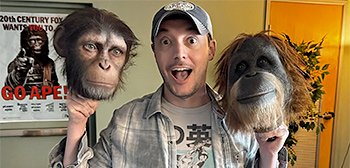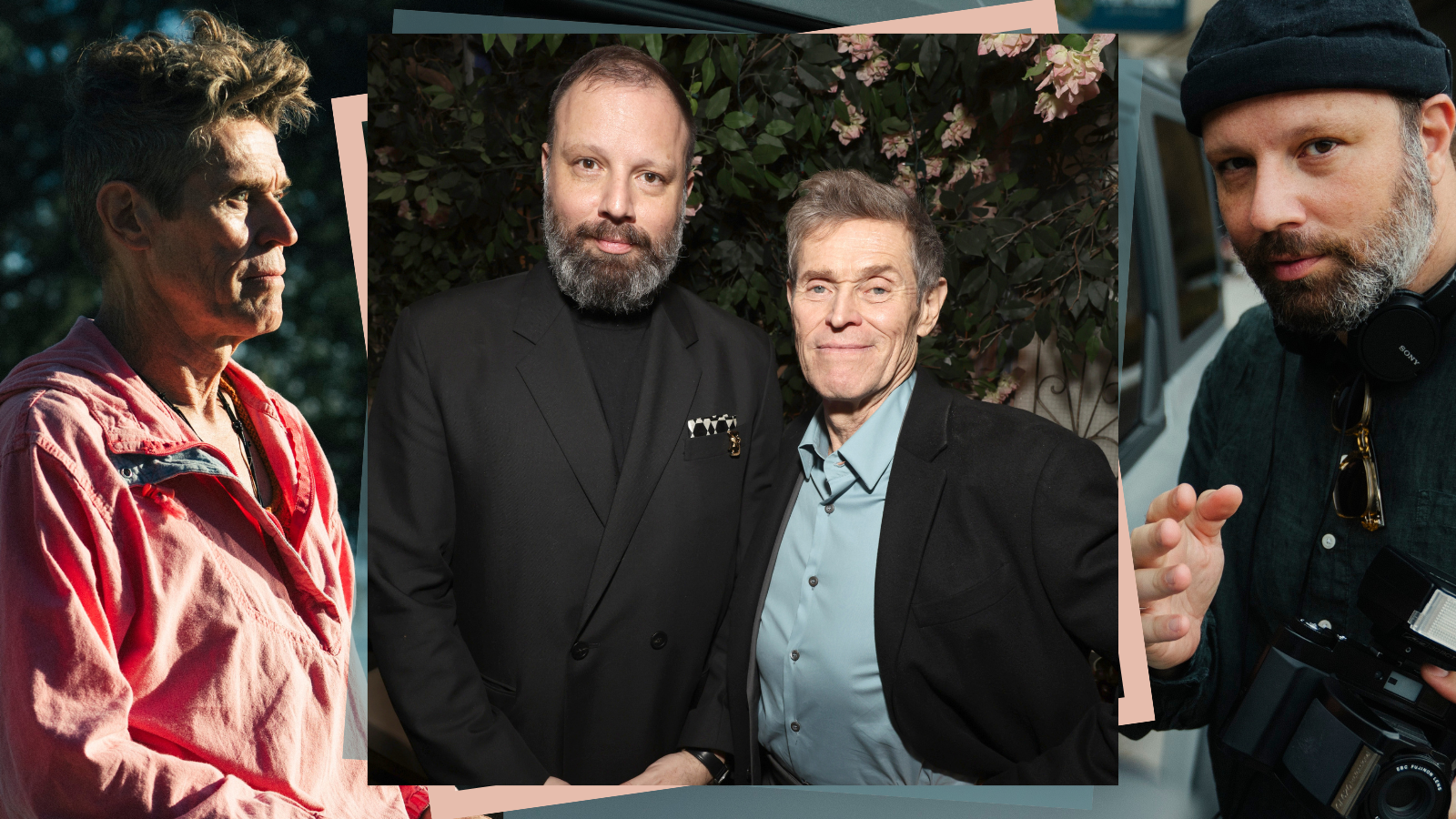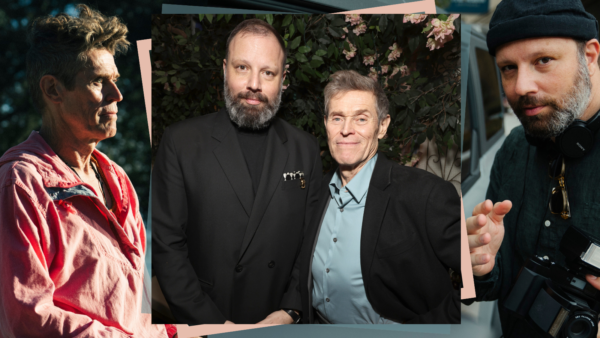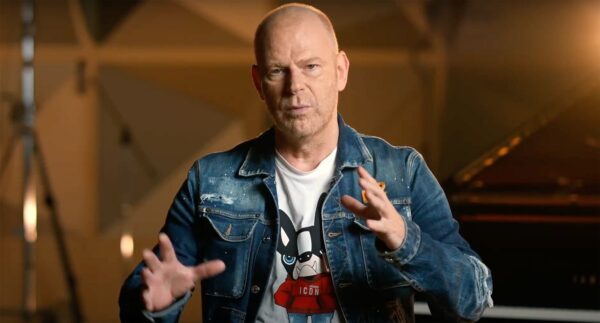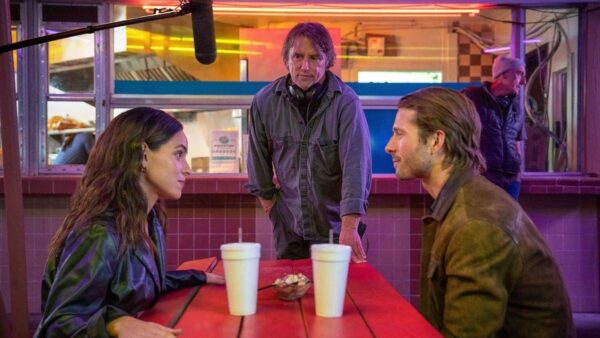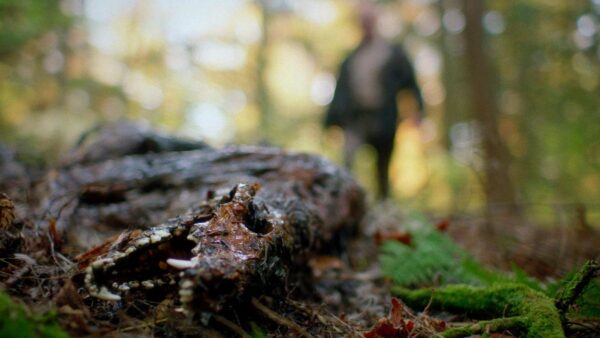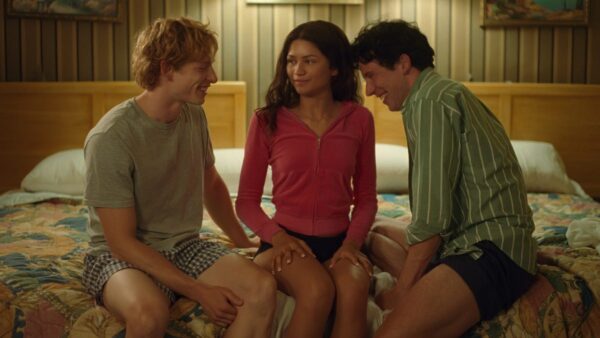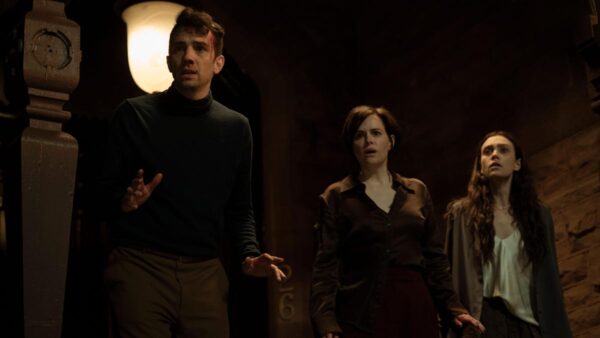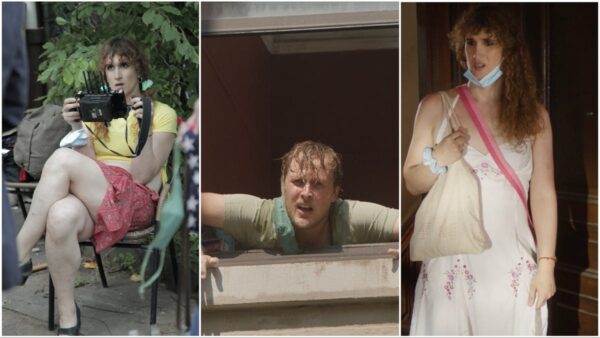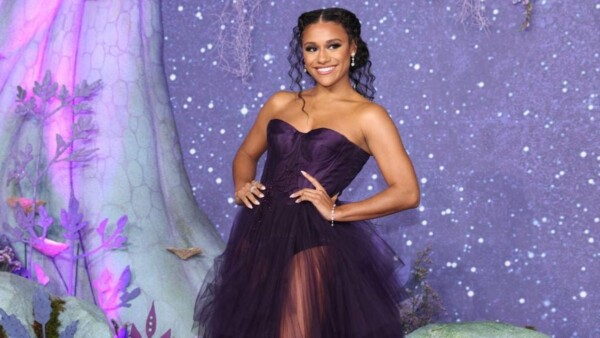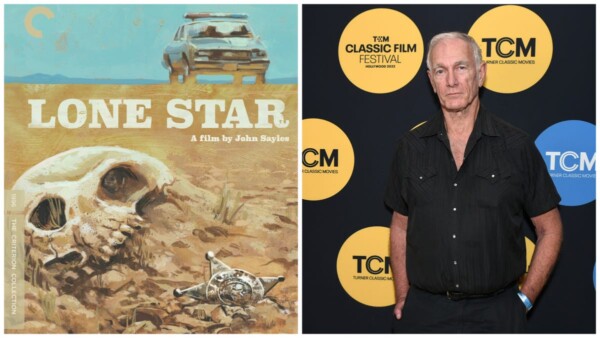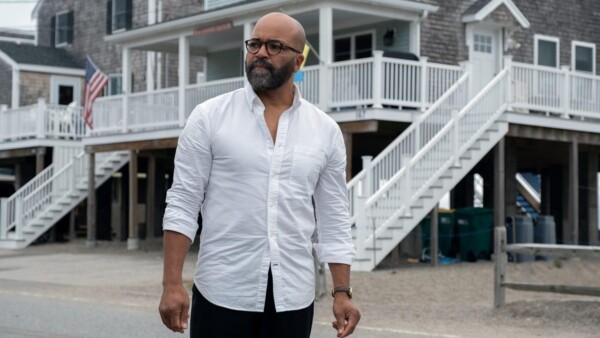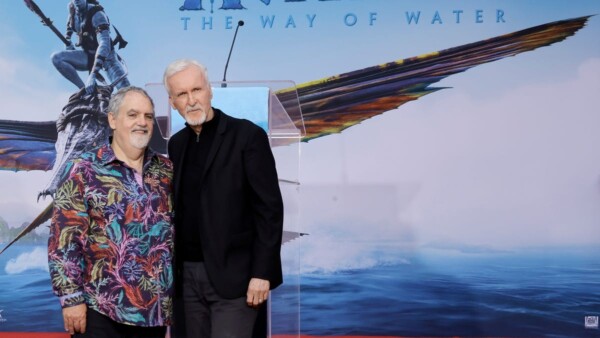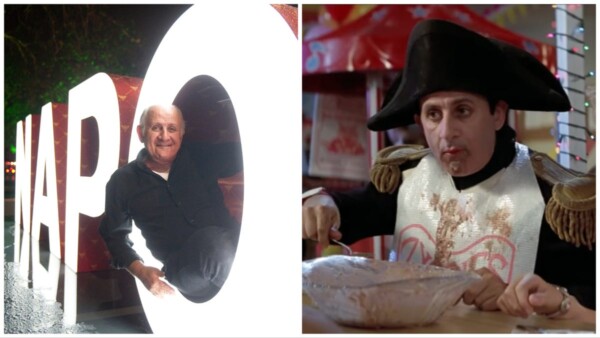Interview: Wes Ball – Director of ‘Kingdom of the Planet of the Apes’
by Alex Billington
July 11, 2024
“We love Apes movies, let’s be happy we have another cool Apes movie to watch.” He’s so right about this! One of the best sci-fi movies of 2024 is the latest take on the Planet of the Apes franchise – titled Kingdom of the Planet of the Apes. Directed by sci-fi filmmaker Wes Ball, the movie opened in theaters in May and ended up becoming a massive box office hit over the past few months. I’ve actually been following Wes Ball’s filmmaking career for over a decade – we posted his acclaimed VFX short film Ruin back in 2012 when it first launched. That became a viral hit, then he got the gig to direct The Maze Runner movie, which ended up becoming The Maze Runner trilogy. Somehow in the 12 years since Ruin debuted online, I realized I had never actually interviewed Wes formally for FS. It’s finally time… I asked Wes to have a conversation after watching Kingdom of the Planet of the Apes in May and we talked for over an hour about making this movie. Along with recapping his entire career so far, his thoughts on VFX, Apes mythology, and much more. Enjoy.
This one-on-one interview was conducted over Zoom with Wes. The text has been transcribed and edited for clarity. I’m so glad I could talk with him, and dive into these geeky topics. The interview ended up going on for over an hour, and I’ve left most of his comments transcribed exactly as stated during the conversation. Ball got his first real directing gig on The Maze Runner movies, which established him as a legitimate sci-fi director in Hollywood. He then started working on a big adaptation of the Mouse Guard books, and it was about to start production before they shut it down. This is what led him to the Planet of the Apes project, and the rest is history. Ball is now in the middle of developing a Zelda movie for Sony Pictures & Nintendo, which is a daunting project. He was in Japan on his press tour for Apes when we talked, and I wouldn’t be surprised if he spent time meeting with the Zelda creators there as well. I’ll continue to follow and celebrate his work. You can also read a fun Reddit AMA with him here. Below is my extensive conversation with Wes.
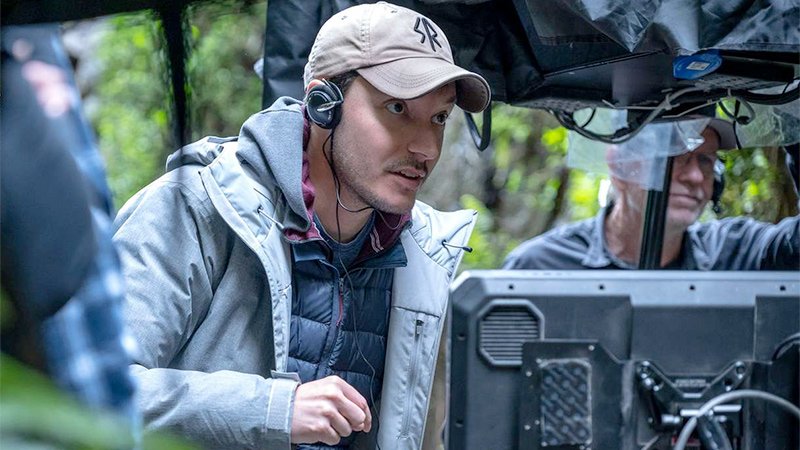
I’ve been following your career so long and it’s exciting to see how far you’ve come now. From Ruin to the Maze Runner movies and now making this awesome Apes movie. At this point, do you feel like you are where you were hoping to be at this point in your filmmaking career?
Wes Ball: I definitely don’t look at it that way of “where do I want to be?” I definitely don’t approach it that way. Certainly if I look back on all the Maze Runner movies, I like to say that they were good practice. They were my first movies. I didn’t know what the fuck I was doing – being in the studio system, all that kind of stuff. It was a really good training ground for working into the studio system, and working on… I guess you could call them event movies? The thing about the Maze Runner movies is – the first one [had a budget of] $34 million, the next one was $50 million, the next one was $60 million or something like that. Combined it was a $150 million budget for all three of them. But we still almost got a billion dollars in box office. So they did their job with the fan base that they were aimed at. When I first came on, they were like, “yeah, we want our Hunger Games…” Those books had sold only 5 million copies, compared to Hunger Games’ 60 million copies, or something like that. So the fan base just wasn’t there, but what we did is we created a fan base. We opened that movie up to people that didn’t know anything about the books. So we kind of created a little franchise for them. Although I’m very aware it’s not really considered some kind of premiere franchise.
I haven’t looked at them in a while. Maybe in a couple years I can go back and look at [the Maze Runner films]. It was an interesting thing where you can see… The first book was pretty good storywise. Most people who have a gripe with that movie don’t like the ending – where suddenly it goes into this other place, which is obviously where the rest of the books went. The story material got progressively trickier & trickier to deal with. On the movie side of things, from my side, when I look at it, I see the craft and execution going up [with each new movie]. So that’s what those moves became for me, we just got to make the movies because they were so cheap. The studio wasn’t breathing down by my back. It wasn’t like, it has to be this. We just got to do our thing. And what’s interesting about these movies is they’re so distinctly different from each other, with genres and style and all that. I got to really stretch my legs and see what I could do.
I look at The Scorch Trials, for instance, which some people thought was a step down, but – oh, that’s really well shot. It has pretty significant set pieces. And it’s my first movie with Weta, for instance, too. So that was where I felt, okay, cool, I got a pretty damn big budget. I didn’t feel so limited like I did with The Maze Runner where it’s like – you can afford 8 Griever shots, or whatever it is. I could do what I wanted on that [sequel]. That was fun. And then obviously from there it transitioned over to the Mouse Guard project. Which which was awesome. It was a fantastic experience, other than how it crashed & burned right at the last minute. But that was where we were playing on a much bigger canvas creatively. Just with the world creation and the sheer scope & scale of that thing was massive. We created so much of that stuff and got so close to it and then it went down. I’ve told the story many times, but that’s how that led to the Planet of the Apes stuff. But the Planet of the Apes movie, you know, we obviously still had to make it for – let’s just say, less than the previous [trilogy of Apes] movies. And we had to make it faster than the previous movies.
Now we get to show what we can do… But I have to say, I’m the kind of guy, everyone knows this about me, I’m a glass half-empty kind of guy. I can’t help but look at it and say, I can do better. But I haven’t done that. I haven’t gotten to that point where I’m like – this is it, this is what I can do! I’m not there at all. But I’m certainly proud of it all… I think everyone did a really great job and it was a very smooth process. Dealing with that level of the technical side of things was crazy. And the story stuff, I thought we had a pretty good story going in [to Apes], so I felt pretty good about that. I’m at that point right now where I cannot really watch the movie [Kingdom] and judge it [properly]. I’ve been on this for five years, so I can’t look at it… All I see are the choices, basically. I just see, oh, that scene we were wrestling with, we got it. We put that shot there and we put that thing there and we put the edit there and we put the sound in there. And I just see the choices now. It’s hard for me. I’m too close to it right now to actually be able to judge it for what it is.
It’s tricky too, because you can’t – unlike the Maze Runner movies where we did these big test screenings and stuff. I knew the fans were going to be okay with it, because they all went, they all came out to the test screenings and watched it. I could use that as a caliber of [success]. But on Apes, you can’t test this movie. Because it’s so unfinished until the last minute, and by the time you can test it, then it is too late. What I did more on this movie – I let my friends come in and watch it, like Justin Marks, I had him come over and watch it early on, and let my buddy T.S. come and watch it. Different people come in from outside and watch this thing and tell what they thought. That was an interesting approach, just to gauge, where are we? And even then, it’s hard for them to judge, because it’s this fantasy movie that wants you to immerse in the world and get lost in it all, and yet every other shot is like a stick figure or some animated thing. Just everything about the movie [at the time] is telling you you can’t get engaged. It was a big leap of faith through it all.
I don’t know how the reviews are going to go… It’s always a gotcha. It is what it is. The studio is happy and from a technical level it all [making Kingdom] went as smoothly as it possibly could… From a production level it went really smoothly. And so now it’s in the audience’s hands to judge or do what they will.
I’ve noticed your choices so far are about mainly doing movies you’re passionate about. They speak to you and your potential. I also think of someone like Matt Reeves, where he’s making a Batman movie, but you can also feel that it’s specifically a Matt Reeves Batman movie…
Wes: I think he and I are similar in the way I can’t do a movie unless I totally feel it. I’m not a journeyman in that way that, “I can shoot it, I can do that thing. I can go in, take a script and just do the best I can with it.” I just can’t do [that]. I’m not that guy. I’ve been fortunate – with [studio executive] Emma Watts at first with Maze Runner, she brought me in and on all these projects I’ve been in at the very beginning. So I have kind of authored it in a way, so there’s a sense of myself all over it. And I don’t even know what that means, you know? I couldn’t tell you. Of course – you can’t self-analyze. I can’t tell you what it is, because I’m there from the birth of all these [projects], it allows me an in, so that I can figure it out. I’ve been offered so many things… From Marvel to Star Wars stuff, all the usual suspects. But I have to always turn it down because – it’s not me. I don’t know what to do with it. So I’ve learned that feeling of like, ah, I have to do this.
It took me a while on this Planet of the Apes to find that place, when we were first starting. That’s probably where that comes from. I imagine Matt is probably the same way where he doesn’t do anything unless he is really passionate, or feels that I want to do this, and go out on this crazy adventure. And especially on this [movie]. It’s been five years now. Part of that is because Covid hit and whole regime change that happened [at 20th Century Studios], that created some blocks in there. But still even if that wasn’t there and it was smooth sailing, it probably would’ve taken three or four years to make. You just can’t go into that without this real sense of, “I know how to do this.” I imagine that’s why [you have this feeling about my movies].
I was asking because I was watching it and – you have a producer credit, which is awesome…
Wes: That’s more because I kind of “earned it” from the Maze Runner movies. It travels with me no matter what. But yeah, I am a producer on it just based on what we do. I’m involved in all those things – hiring the crew or picking that person or managing the budget. Where are we going to put the budget? Where are we going to put the time? It is all producer [work].
I’m also curious how much carryover there was and how involved the creators of the previous Apes trilogy were. The screenwriters / producers Rick Jaffa and Amanda Silver did such an incredible job with those three movies. How much were they still a part of this one? There’s a continuity that is clear and obvious (Caesar’s legacy) yet it also feels like something new and fresh. How much was your own pitch? How much was meant to be a continuation?
Wes: [Screenwriter] Josh [Friedman], especially when he came in, really crafted a great screenplay. After about a week of me thinking about it, I pretty much pitched what you see. For the most part. The one thing that I did not have was the human story aspect of it. That human component of it. I knew there needed to be the human story in it. I told them, “We need a human in there. I don’t know how that’s going to fit in there.” I immediately had: there will be the egg climb right at the opening, this rite of passage thing with the young apes. But for instance, I thought it was going to be this young ape – I used to call him “Curious George,” because I didn’t have a name. But I thought he was this curious George type, this young ape who’s curious about the world. And he’s going to go off on this rite of passage, and he was going to have his older brother with him showing the reins. And then Josh came and said, no, don’t make it his brother make it this trio of friends that you get to follow throughout this story. I knew it was either: Noa is going to know about Caesar, or he was not going to know anything about Caesar, it was going to be an outside force that knew about Caesar. One or the other. Eventually we decided on – Noa knows nothing, and then an outsider comes in which let us play around with this twisted version of Caesar’s legacy. I had this big village attack early on, so I pitched that. And then I had this Proximus character pretty much locked down as this outside guy. I kept talking about him like he was Genghis Khan.
So I kept saying, telling them: “Apocalypto with Apes,” basically, is the idea – the structure of it all. Not the revenge story aspect, but the basic concept of the small isolated tribe that gets thrust into this awakening of a larger world out there. Obviously it all changes as you keep working… So I can’t even remember it now, how much I had come up with or not. Before even Rick & Amanda came on, I had the title – it was going to be Empire of the Planet of the Apes or Kingdom of the Planet of the Apes. Obviously you couldn’t do Empire of the Planet Apes. It wouldn’t work, but it sounded really good. And I thought it gave this idea of the First King Ape and how this Bronze Age idea was going to come into play, with cultures and different societies. I kept talking about The Force Awakens, that concept of of Luke Skywalker just being a myth and legend. “Oh, he’s real?” That’s a cool idea. What if we played with that? And this sense of a lost history, these dark ages. One of Disney’s asks basically was: can it be less dark?
They thought that really hurt the franchise. They were really worried. They thought maybe the darkness of the last one was the reason why [audiences didn’t watch like the other two]. I’m not sure that’s true. There’s a lot of factors in there. I understand what they’re saying is that you really endured that last movie [War for the Planet of the Apes]. You endured that struggle with Caesar. He suffered throughout that movie. That’s a tough experience for some people. Movies are always about the time we’re in. So where were we as a culture in that moment? Did we want to see that? There’s that reason that we had this era of anti-heroes, because we were living in the high times. Now we’re living in some kind of dark times, anti-heroes are not so much a thing anymore. Movies are always connected to the time they come out.
[Disney’s other ask was:] can we try to open up the audience? There’s so many groups of people that don’t go to these Apes movies, and don’t know anything about them. How can we get them? So we tried to come up with a story that you could invite others into… That for me was everything. As soon as I came up with that idea – oh we’re going to have a time jump. At first I thought it was going to be a thousand years. But eventually it came down a little, a couple hundred years, it needed to fit in there. Once we got to that, that’s when all these ideas opened up and it felt so obvious. So perfect. That’s when Emma said – okay, we have to talk to Rick & Amanda about this. We can’t do anything because the Caesar character was going to be in it. You can’t even do it without them anyway, contractually.I got word that they will visit and hear my ideas. And so they came in – super nice people, of course, I love Rick & Amanda. And I was like, “blah, blah, blah – boom.” Just laid it all out for an hour and a half. Just talked about all these opportunities and ideas. I could see them suddenly opening up: “Oh, okay. Yeah. This isn’t just a part four. This is not a part four, this is a part one.” But it’s still very much tied to those previous movies. And so they said, okay, this is pretty cool. They were working on something [else] at the time, and they said: “Look, we can’t write this, but you should, you should ask Josh Friedman to come in. We just finished Avatar [sequels] with him. We loved him and think he’s great.” Then I talked to Josh about it, said the same thing. Just laid it all out, all the different ideas. And he was the one who said, oh, you want to make a Kurosawa film? And I’m not sure that’s totally true, but I totally appreciate the idea where we want to make a real movie. And not just some cheap reboot or cheap grab at extending the franchise.

For the first chunk of the script, Rick & Amanda were just producers on it. Then Josh delivered the script. It was awesome. It was 160 pages or something. It was way too long. So we had to whittle it down, and that’s eventually when Rick & Amanda took over writing duties for a little bit. And it evolves, as it does, as a big team effort. And for me, a big process of all of this is, is about the concept art. While we’re working on the script, I’m also designing the look with all my concept art friends that I work with. And so some of that stuff, it’s just images that are in my head that I don’t know how they fit into the movie. They’re just, oh, this feels right somehow. This thing, this giant ship on the on the edge of the coastline. That’s cool. It’s like a castle. It’s in the ruins of the thing. Eventually that makes its way into the script. That’s the process. It was really fun. Again, I can’t say I take credit for everything in the movie. The basic rough block of it was there. It felt obvious when you’re talking about early on, like this is right, this feels right.
Were there specific rules from within the Planet of the Apes franchise you had to follow?? Or did you have complete freedom to do what you wanted within your world?
Wes: That was a big part of us saying: look, there’s so much love and respect for that previous trilogy. How do we honor that? That was the big thing upfront. We want it to feel like it was born from those movies but to stand on its own. That’s where that orangutan Raka came in. And that sense of – we’re going to have two dualities of Caesar. It was all us, there was really no studio involvement. At the time it was Emma Watts before Steve Asbell took over [20th Century]. Emma’s always been really good with us. She trusts us and believes in us, and lets us go do our thing, because we’re responsible. It wasn’t a lot of worry at first. That didn’t really happen until – when Emma left and Steve Aswell came in to take over the reins, that’s when suddenly, we’re getting closer to something that we might go spend a lot of money on. Even then, they read the first draft, “This is awesome.” They got excited, too. And fortunately – Steve Asbell, he’s an old friend. He’s the guy that actually bought Ruin from me at the very beginning. So there’s this long history of all these people playing in this space together. We’re all collaborators and friends that like movies. We have to feel like we’re a apart, we don’t want to reboot anything. To bring in all that stuff from the Caesar legacy, but also the Charlton Heston stuff, that’s all over the place. We felt – we’re heading [to the original POTA, but] it’s way off. That gave us a lot of freedom. But behind us is this great trilogy. So we were always in between those two worlds. I’ll credit Rick & Amanda, they had been thinking about these apes for so long. They had done all their own research. You can even see the influences from Conquest of the Apes. Right? How similar Rise is to that movie. How many things they took from that to make this reboot of Rise is amazing.
They’ve been thinking about Apes movies for a long, long time when they decided to reboot it. It was 2008 when they actually pitched it first. They have been around forever, they were really these godfather figures remind us, “don’t forget this, we want that.” We are such big fans of these movies that it came naturally. It was not a struggle to feel like we were a part of those worlds, and those elements could find their way in.
The Apes VFX look even better than ever in this movie. I am wondering: did you go back to Weta and say, hey can you re-open the files and update it a bit? It feels like you went back to what was so great before, even though it feels like an evolution of the VFX in many ways.
Wes: A lot of that is just Weta. They’re just fucking amazing what they do. They’re the best in the world at what they do. So it’s humbling to be around them. And I have a little bit of experience with the VFX [work], so that helps things, so we can talk about things in a way that we get to the end result quicker. The truth is, on every movie you start from scratch with Weta. Even Rise, Dawn, War, it’s every movie they rebuild the characters from scratch because their pipeline changes. And all their tools change, so you can’t just go back and reopen the files. The only thing that we did that for was on the opening stuff with Caesar, but even then, they had to update all the shaders and textures because they don’t apply anymore. So we had the raw model, we’re using the same model. But even that has to get re-rigged and re-skinned and re-furred and… That was the one thing that people won’t appreciate here, is that not only did Weta have less time to do this, they also had to create whole new sets of characters… Rig them, design them, all that stuff. I remember days and days and days of going through Noa’s look, his iteration. And me taking the files and fucking with them, then sending them back to them, and they sent them back to me.
It was this constant exchange of like, see how his muzzle shape isn’t quite right. If he came in 2mm, or you changed his eye shape here, or slightly further apart eyes. It’s amazing the amount of subtlety we go through with these designs trying to get them [right]. Yeah that’s Weta, man, they’re freaking amazing. I love the Avatar movies. I’ve been wanting to do a mo-cap movie, a full mo-cap movie, forever. That’s where Mouse Guard came from. I want do a movie like that. In this movie [Kingdom], there’s 35 minutes that is 100% full CG. Which is a little different than these typical Apes movies where we go to our locations and we shoot, but there’s some places where we just couldn’t build it, or we couldn’t afford to do it, or whatever the reason. So there’s 35 minutes of 100% full CG images like Avatar that I don’t think anyone will ever notice. There’s the obvious stuff, like the first 10 minutes is full CG. All the climbing stuff and the nests and eggs. Obviously we can’t build a giant skyscraper but it looks pretty damn good. That’s why I want to release this visual effects behind-the-scenes footage. Where you can really see it all and think like, “holy shit that’s CG?!” There’s so much of that all over the movie, it’s pretty amazing.
It’s tricky – with VFX movies, there’s always shots where we’d all look at them and be like, “I wish that one could be better.” But we gotta move on… Because otherwise we’re never going to get the other shots done. The trick is – hopefully the consistency is there. Because that’s the thing. Someone told me once, I think it was [VFX artist] Joe Letteri: “It’s not about photo realism, it’s about consistency.” It’s about making sure it’s all one level because it’s the shifts between quality where it bumps you out constantly. So we tried to stay focused on that and make it one continuous thing you just slip into and you accept. When the shots would come in from Weta, you’re just like, holy fuck. What’s crazy – you think you’re done. “Oh, that’s a great shot.” And we move on to the next shot. There’s this process where I’ll QC it, saying it’s basically done, go through all the process. And then that final shot would come in, and like, whoa. You just opened it up even further. I didn’t even realize how good it could look.
Just for my own sake, working on this level now, Maze Runner was nothing like this. We had a couple matte paintings and some extension work and things like that. But this craft and creation [from Weta] is on a completely different level. In terms of what the light does and where do you put it, and the bounce line, and all that stuff to make it feel real. It’s just on a completely different level. Now it feels like – once you taste something great, you can never go back to what you thought was great [before]. Now I know what to look for and what’s good, and what’s that next level. It’s like what Pixar talks about when they talk about their stories. The trick with them, all the time that they spend on their movies, it’s knowing to push further when you think it’s done. And it’s not [done]. That’s when you push further and you open up into a new world… “Oh wow, I didn’t even realize this was possible.” That was fun to get there.
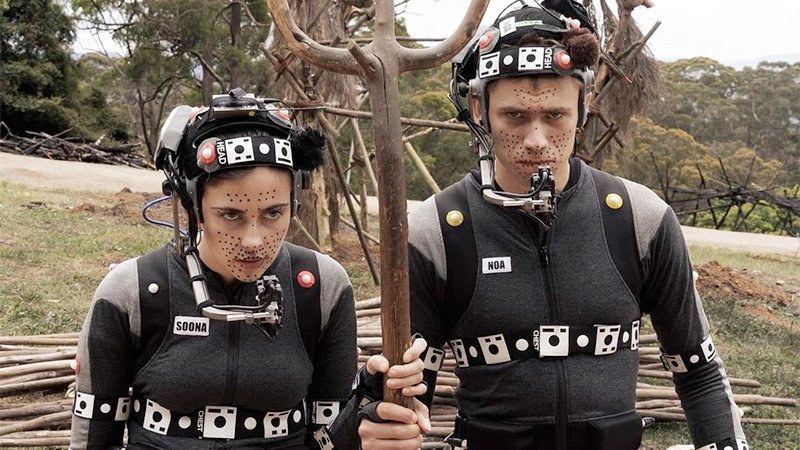
There are so many bad arguments online about VFX and what looks good and what looks bad. So let me ask a real filmmaker who has extensive experience with the VFX industry: What is the secret sauce that makes VFX actually look good?
Wes: A lot of it is is context. So much of it is context. You’re seeing all this stuff out of context [in trailers online], where you’ve got shots that are bumping, because the shots aren’t meant to cut together. Not only that, but honestly, in the trailer, especially for our movie, half of those shots are not final. Half of them are just, we got them out the door because marketing wants them. Most of them are unfinished. I bet you people could take those trailer shots and compare it to the final movie, and they’ll see that oh wow it’s actually a different shot. “It’s a wonderful day!” That shot that keeps showing is an old version from six months ago!! And I’m like, can’t you guys update the shot? It is so much better now.
The other thing people watch this on YouTube and Twitter. And it compresses the fuck out of it. And so it looks terrible. But I think sometimes when people say, the CG looks bad, they’re not talking about the CG, they’re talking about – they don’t like the photography of it, or they don’t like the lighting on it. And it’s not bad… It’s just, they don’t like it. The previous two movies with Matt Reeves, they shot in that Vancouver light. Everything was Vancouver. It’s soft, beautiful light overhead, it’s just perfect. And he shot with really super long lenses with a full open gate and it’s a different look. I’m not saying it’s better or worse, but it’s a different look. And I think sometimes they don’t know what they’re talking about when they say, “it doesn’t look as good,” what they mean is, it doesn’t look the same.
When people watch the movie they’ll say it’s good, it’s fine. Maybe they’ll say it’s better, it’s great, but I don’t think they can say it’s bad. I think the work in there visually is about as good as you can get right now. And also it’s an element of: we chose early on that we’re getting out of Vancouver light, we’re getting out of that world. We’re not going to shoot in Vancouver, I didn’t want to do that. We’re going into sunlight and we’re going to get that ’68 look. Where they shot [the original movie] in Malibu, California. I wanted to get to that side of things. So we shot a lot of sunlight and it’s an ugly light. It would look ugly if it was an actual person there, but we just embraced it. It feels raw and kind of old and not so polished. We went with it…
I understand the instinct, it’s the nature of the beast, this desire for people to pit movies against each other. It’s either: you are team this or team that! We didn’t approach it that way! We just want to be alongside. I’m totally happy if we get close to it. I think Dawn, especially to me, is a perfect movie, it’s so incredibly well done. It’s naive for me to think we’re ever going to surpass that. I did not approach it that way. We wanted to make something that felt like it was a worthy successor to those movies. And of course, the [original 1968 movie], too. I wish people would get out of “this versus that.” We love Apes movies, let’s be happy we have another cool Apes movie to watch. And if we’re lucky, a new set of movies with new characters.
Another Hollywood question I must ask you now: How do you feel about budgets? What is an actual filmmaker’s response to the claim that budgets are way too high in Hollywood? Some movies really do need a proper big budget. Right? What is the honest insider take on this?
Wes: I will say upfront that I do think movies need to be made cheaper. We’ve got to figure it out. It’s getting crazy. And not just anyone can make these movies… Our movie, we had to make it cheaper, because okay the box office is going down on these movies and we’re not going to spend what we spent on the last movies. So we had to come in significantly under $200 million for them to greenlight this movie. That was part of the reason we went to Australia, because of the rebate. That’s why all of the movies now, we don’t shoot in Los Angeles, we shoot it wherever the tax rebate is going to be. Which is fine, it’s what it is right now. But yeah you’re also right – these movies require a certain amount of budget. And most of the budget goes to Weta. You look at the credits and its thousands upon thousands of people that have to do all of this [VFX] stuff, it’s just an insane amount of work. That’s why I hope people go to the theater and enjoy it because the level of craft and artistry on display, there are very few movies that will ever be able to do this. There are very few movies that will ever get made that have that level of craftsmanship.
It only comes around every once in a while where you get to really spend the money on the visuals itself. The money is on the screen. That’s what we like to say. Not to say I couldn’t have spent more, there’s plenty of places in the shooting part of it where I’m like, man, we could use another day on this, or another day on that, or whatever. We’ve always been really responsible, not going over budget. We came in $5 million under budget when we made the movie.
I also read a news story about how Denis Villeneuve came in under budget make Dune: Part Two. How is it, or why is it, that these two massive VFX-driven sci-fi movies in 2024 are both amazing yet somehow they came in under budget on production?!
Wes: I’ll tell you why, though. It’s actually obviously not that difficult. It’s the same reason that Jurassic Park still works. It’s a tiny bit dated, but it still looks great. Because it’s shot right. And you’ve got a real eye for shots. So many things are like, we’ll figure out in post. And if you do that, you’re going to come up with some shitty shots. Same thing with Pirates of the Caribbean. Gore Verbinski knows how to shoot a movie, knows how to shoot a shot, how to design a shot that’s cool, that has a story to it. And I try to do that, too, where I can. We have some pretty complicated, crazy shots in the movie that have storytelling. And they’re not just fancy for fancy sake. And I think that’s a big part of it. We know how to light and shoot a shot. And then the CG only looks better in that arena. Denis is obviously, he’s a a hell of a craftsman. He knows how to do that stuff. Maybe there’s something to the artists enjoying their time on the movie, too. An actor who really loves their role. Something comes through… They go a little bit further. They’ve reached further into places. And I guarantee there’s plenty of that with our artists on this movie. They loved this movie. And they had a great time on it. And it was an easy process. It was the easiest finish I ever had.
I remember on The Death Cure, we are at the last minute, and in the last hour we were working on shots. It was tough. And this movie, despite it being 1500 shots (and there’s only 30 non-VFX shots in the entire movie). Every single shot is a crazy, epic achievement of – well that’s a CG Ape you believe it is real! We just got through it. We coasted to our end and it was wild. It’s a good team. Really, really talented people around it. We had the A-Team on this one. That makes a difference too. So it’s a lot of things. I think the biggest one is that – it’s shot design. That makes it work.
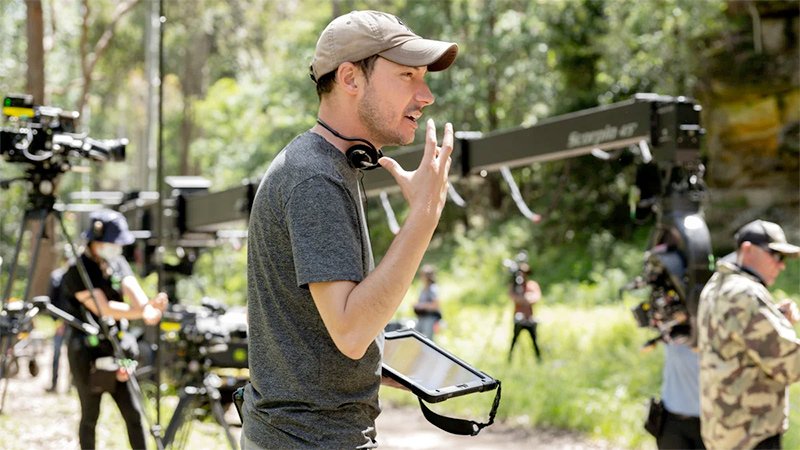
That shot of that T-Rex with that long lens [in Jurassic Park], and that light coming through there. It’s a great shot on its own. And then it’s just easy to put the CG in there… I think a big part of it is shooting your locations. And that’s what we do now. That’s why I’m proud of the stuff that’s full CG, because that’s what I was really worried about. Is it going to look cartoony? It is hard. I’ve been studying James Cameron for a long time and I’m still blown away sometimes by how Cameron makes it feel so real, just the way he shoots it. There’s a big part to camera moves, how you judge the closeness. I had a couple shots where, I did my camera stuff and I had all animation, and then you render it, and ooooh that feels like a video game. As soon as you put everything real in there, the camera doesn’t work anymore. Or the camera’s too close. It only happened a couple of times, but, “sorry guys, we have to go back and rethink this a little bit.” Now that I know how it translates. So that’s a big part of it. I’m really happy about the full CG stuff, and I think when people see what is real and what isn’t, they’ll be like “oh, wow, holy shit that’s crazy!”
I love the shot of Noa looking into the telescope, one of my favorite shots int he movie. But we never get to see what he’s looking at and I like the magic and mystique of that decision.
Wes: I’ll give Josh some credit here. He desperately wanted me to show what he saw… And I said, Josh, I understand. This was a huge debate everywhere, throughout the studio and with the producers, but I stood my ground and said, “no, I’m not showing it.” Because the truth is, no matter what I show – it’s not going to be as interesting what you have in your imagination. So to me it was absolutely one of those director choice moments, that I’m sure is going to piss some people off… To me it was way better that it’s more about his reaction than what he’s seeing there. You look at that emotion in his eye and you see his eye darting around. There is a little reflection, by the way, in his eye. You never can see it, but there is actually a reflection of what he’s seeing in his eye. It was fun to do that. I find that so much more interesting. To me…
Do you think it’s possible to one day actually make a Planet of the Apes movie without any humans in it? Would that ever actually happen and/or could someone pull it off?
Wes: My first initial idea [for Kingdom] was exactly that. I knew we were going to start from the Apes point of view. For about a week there, I was like, I bet we could do this with just Apes. We could probably do it. Then I chickened out and said, nah, you have to have humans. I kind of believe that’s true because the core of these is ultimately: can apes & humans live together? That’s what they’re about. That’s what it’s all about.
True, true.
Wes: There was a research project after War [for the Planet of the Apes] came out [in 2017]. They did this whole deep dive research – polling people, talking to test groups and all the market research stuff that big studios do. And number one thing that came out is – they want humans that they can engage with and root for. For whatever reason. They need it. So we decided early – we have to have a human in there somehow. Maybe we do the feral human thing. I knew feral humans were going to be a thing because how we left the previous movie. Josh was the one who really cracked it… There’s a human girl and there’s more to her. And that will let us go into the future movies and I’ve got ideas for where we’re going in the next one, where you do a lot more with the humans, actually, and you make that more interesting. Let that relationship continue to grow between the Apes and Humans. And let it get complicated and tricky and all that stuff.
I think that’s what makes this franchise so interesting. You go to the zoo or watch these ape documentaries like Chimp Empire. And it’s mesmerizing. Because you see they’re so like us, on so many levels. They have the same emotions. We are not that far apart. And I think that’s a part of it with the [quality of the] CG. You watch these creatures and a scene that would be otherwise kind of boring, and somehow it transcends itself because it’s Apes doing it. And the burden is on Weta, they have to make us believe that they’re real, and that it’s not a cartoon. But they’ve proved that they can do that. There is something about that where we see ourselves in them and we relate to them on a human level. Also I think Noa’s story is quintessentially classic Hero’s Journey that is easily relatable on a human level.
To wrap up up with one final question: How do you feel about the film industry in general right now and the what it’s going through? What is your take on it? Are you worried at all?
Wes: Someone told me once a long time ago, the movie industry is strong because it’s the only business that was born out of the Great Depression. In its DNA it will survive, because we as human beings need stories. I do think we’re going through “a time” – it was brought on by Covid. It was brought on by the strike. Back to back. We are one of the first post-Covid movies [to be made and released]. We literally started writing this in the middle of Covid… Our production takes a little longer than other movies. We’re just starting now to get to the other side of Covid because these movies take so long to make… There is a lot of doom out there, because no one’s realizing that the post-Covid movies are just now starting to come out.
I also think the movie industry, we always go through these cycles where tastes change. And I think Covid changed the world. It changed our tastes. It changed what we wanted to see right now. I think maybe we’re in this place where we don’t quite know yet what it is we want, but surely, things will come out [eventually and become a hit]. Who could have thought Barbie was going to be this massive, massive thing? I think there’s probably some element of – the world is so fucked up right now, that it is a nice escape to go to these movies and immerse yourself in a world that is joyous and interesting and fun. Not that you don’t have to think, but it’s kind of easy [to watch]. We’re in this place where audiences are starting to figure out [all over again] what is they want to see right now. I think the movie industry will find its way, as it always does.
A very big thank you to Wes Ball for taking his time to do this interview + helping arrange it.
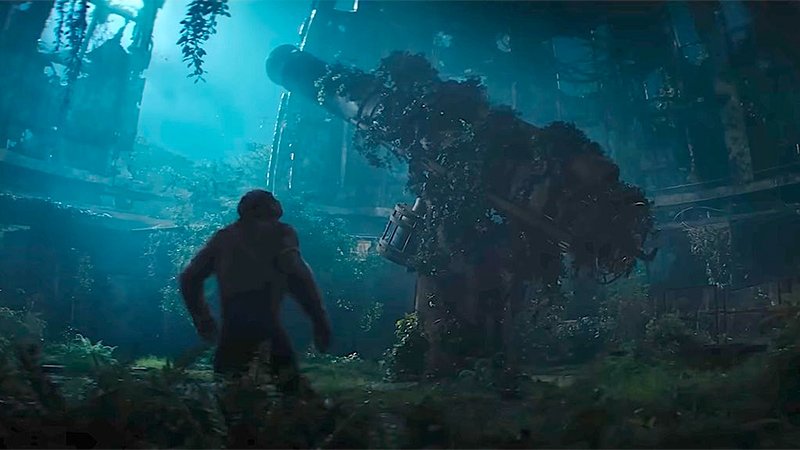
Wes Ball’s Kingdom of the Planet of the Apes movie is now available to watch via VOD at home. The sci-fi action movie initially opened in theaters worldwide on May 10th, 2024 earlier in the year. It might still be playing at the cinema near you or can be watched at home. For more info, visit the official Apes site.
Le texte ci-dessus est une traduction automatique. Source: https://www.firstshowing.net/2024/interview-wes-ball-director-kingdom-of-the-planet-of-the-apes/?rand=21920



